20070612-bowman-mw13-collection-001
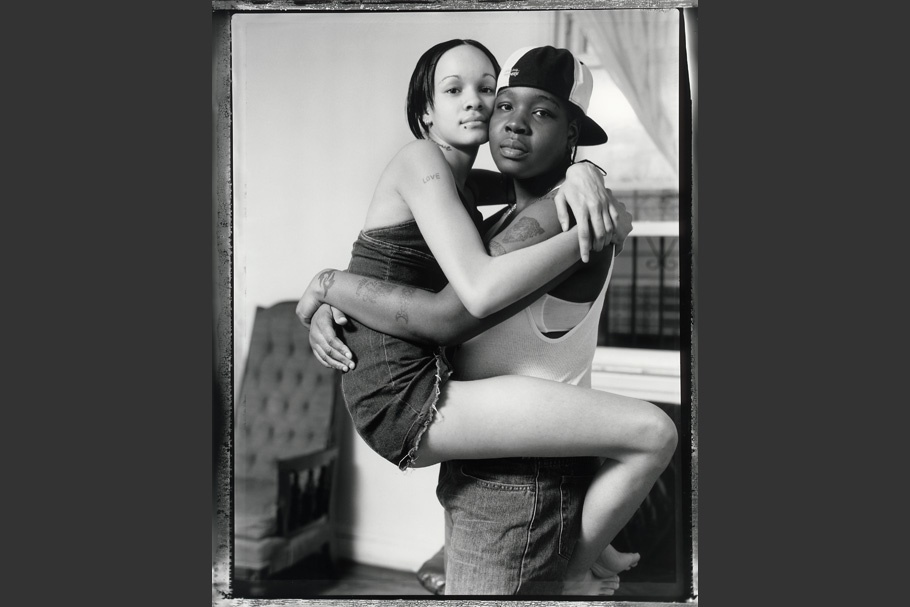
Jamaica section of Queens, New York, March 3, 2002
Left to right:
Roxy Trevino, age 17, Jamaica, Queens, New York
When I was four years old, they took me away from my mother because she was using drugs. I lived in a couple of foster homes, and then I went to my grandmother’s house and my uncle raped me when I was like five.
I lost my virginity to a boy. I feel that the reason I had sex as a teenager was that there wasn’t anybody there for me. My father wasn’t there, and this boy was there for me and this boy told me he loved me, and I felt like I owed it to him.
Before I had my girlfriend Love I was always depressed. I didn’t know what to do, but now that I’m with her, I’m happy. I want a house with my kids and Love’s kids and my niece and her nephew to live together. I guess I would be the mother who drops them off at school and cooks dinner and stuff like that.
Honestly, I’m not mad at my parents. I thank them, because this is the happiest I have ever been in my life.
Love Kye, age 19, Jamaica, Queens, New York
I started dating girls when I was 13 ‘cause I was, like, in Spartan Juvenile Detention and everybody else was doing it and I just followed. I ended up there because I had a fight with my brother. He was 12 and I was 13, and he was beating me up real bad. When he let me go, I ran in the kitchen, got a knife, and I stabbed him in the hand. My mother broke it up with a broomstick and then she called the police and they took me away.
I was in there for like a year and a half. Juvenile Detention was nice. I liked it better than here, so after I came home I got in trouble on purpose so I could go back. I was on probation and went to the store and stole a whole bunch of clothes, and so I went back because I had a lot of friends and stuff in there.
Roxy’s not my first girlfriend, but she’s my first love. My mother don't talk about me being gay. Roxy lives with me and my mom, but my mom never asked me and I never told her. I know she knows. Like, my sister told me she said, “Your daughter’s gay,” and my mom said, “No, she’s not, she’s just going through a phase right now.”
My fantasy is to be a famous dancer and have a big house in the Hamptons. And I want to have, like, four cars. My girlfriend Roxy, her two kids, my five kids, plus my three nieces and nephews, my little brother and just like a nice big house. That’s it.
A perfect family to me is two people that love each other.
20070612-bowman-mw13-collection-002
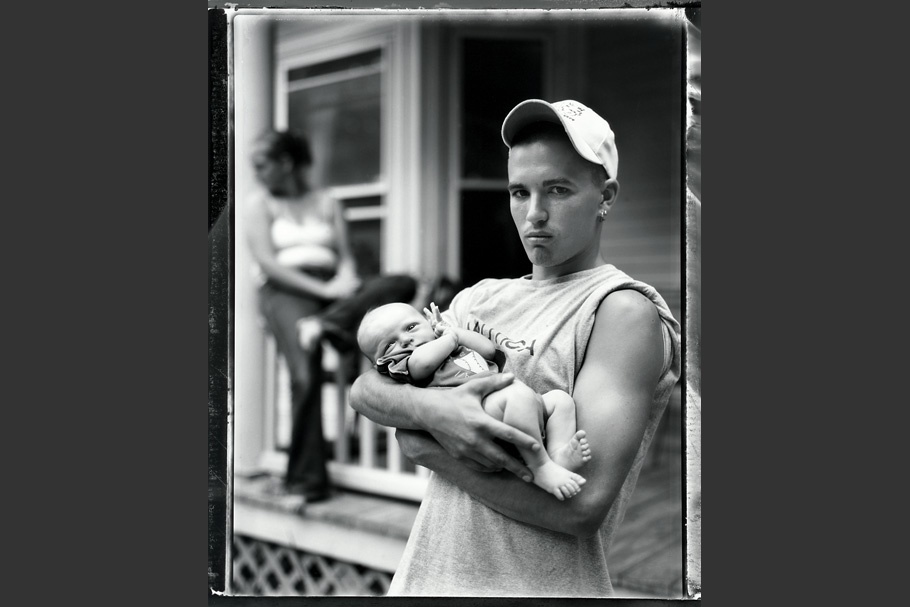
Rockland, Maine, July 5, 2002
Jason Kramer, age 18, Rockland, Maine
I’m estranged from my parents back in Albany. I got in trouble for drug use with the police, and after that my family pretty much gave up on me and that really hurt me, so I just ended up leavin’. I got picked up by, like, a traveling carnival that comes here to the Rockland Lobster Show, and I ended up here. I love Maine. It's quiet and huge and beautiful and there's not buildings everywhere.
Drugs will ruin your life. I did them and I liked them and I got into 'em really heavy, and then I just started makin’ poor choices. I had everything goin’ for me. I was on the right track; my family was so proud of me. I went to a private military academy in New York, and then, like, my last year of school I just dropped out. Started runnin’ away from home every other day and just bad stuff: stealin’ money and doin’ whatever I could to get wrecked, basically.
I'd have to say childhood memories make me the happiest. I look back at all the pictures I have of all my family and I kind of miss it a lot. I remember spending time with my puppy and my grandfather. ‘Cause when I was younger my grandfather was so proud that I was a boy and I was the first one born.
Me and my girlfriend, the mother of my child, were together for maybe seven months. I mean, we were off and on, fighting all the time, [but] for some reason we stayed together and had a beautiful boy. I actually left while she was pregnant. She had cheated on me one night with one of my good friends. I was so angry, [but] I know it is my child now. I know it is for a fact.
I wanted a boy. It could've been anything, but I was really psyched that I had a boy. I spend almost every free moment I have with him. I would like to get married someday, have a family: one boy, a wife, and me, and a big dog.
Family is important. Family is one of the most important things in life I think. If there is such thing as a perfect family, though, I've never seen one.
20070612-bowman-mw13-collection-003
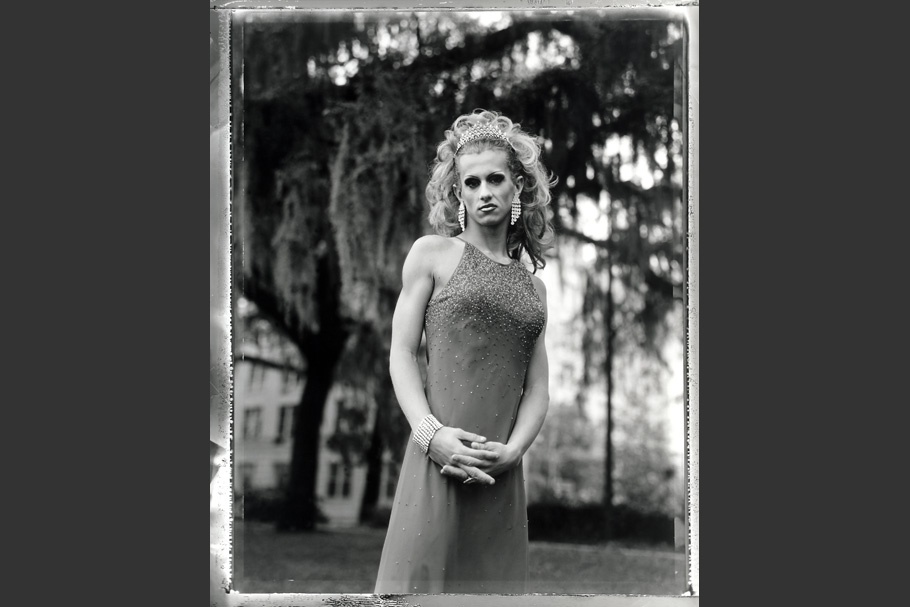
Savannah, Georgia, March 28, 2002
Brittany Nolan, age 19, Savannah, Georgia
I've been gay-bashed before. It happened about a year ago. It just made me open my eyes up to realize that you can't trust anybody that you barely know, because I didn't barely know this kid. He came to my door and just beat me up, you know. I was in the hospital for two days. He had one of those big brass knuckle things and he hit me in the head a couple of times and beat me down to the ground. It actually makes me scared to go home to Indiana, because he had told a lot of my friends that if he ever sees me again he is going to kill me.
I was raised Pentecostal. Growing up, we went to church. My dad was a deacon in the church. The pastor was my uncle. To this day, I don't go to church every Sunday, but I still go. I mean, I pray before I eat, I pray every night before I go to bed.
My dad just found out I was gay three years ago and he disowns me. I don’t think the church would support me, knowing that I was gay. I don’t think they would allow me to go in.
People have told me that gays go to hell and everything, but I’d like to see it in the Bible. Until that day, I will believe everyone is treated equally; gay, straight, whatever, we all go to Heaven.
I've been doing drag for about 13 months now. I had my first pageant last year around Valentine's Day and I won Miss Valentine Savannah 2001. It brings out the flamboyant side of me as a boy. When I'm a boy, I'm gay, yeah, I act gay, but when I'm dressed in drag I can let it all out because I'm a woman, you know?
I can remember when I played with my mom’s dresses when I was a little kid. I think I was like 7 or 8. That’s why, when I came out two or three years ago, she knew all my life; she had time to accept it.
I would probably have wished not to be gay. It’s not a problem being gay or anything; you just have so many people that are homophobic. I mean, it was bad growing up. But these days people are starting to be cool with gay people.
What I like most about myself. I’m very, very kind to people. I’m very openhearted. I give people advice. I’m very respectful of people. I’m just a nice kid—a nice guy.
I think I'm just an all American boy.
20070612-bowman-mw13-collection-004
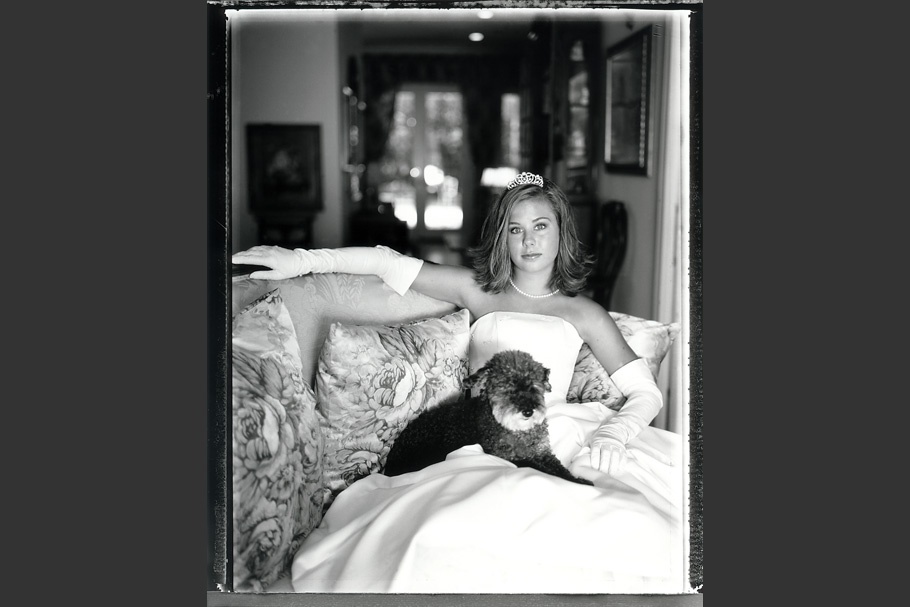
Austin, Texas, August 6, 2002
Amy Heldenfels, age 19, Austin, Texas
I guess I always knew I would be a debutante, because my mom did it and it’s just kind of a thing you do when you turn this age. It used to be, like, to introduce you to society, like, “She’s okay to marry now,” but nowadays it’s just more for the fun of it, a big party, I guess.
Getting into A&M, which was my first choice, was one of the biggest things to ever happen to me; it’s just life changing. My whole family has gone there so it was kind of expected of me, but I also wanted to go there too. I feel like I’ve become more independent and everything, because I was always sheltered in an environment like West Lake.
I grew up in the church; faith is a very strong part of me. I mean, you can just say that you believe in God, but so does the devil. So, a lot of people seem to turn to Him when things go wrong, or they turn away from Him when things go wrong. But if you really want to talk to Him daily and have a really close relationship, almost like a friend, then He’s there every day and can help you through anything.
My faith teaches me that you should wait ‘til after you’re married to have sex. I believe that if you can discipline yourself to save yourself for, hopefully, the perfect person—or someone who loves you that much—then you can tell him that, “I had faith that one day I would love you this much that I saved myself for you.” And I also feel like, especially looking back, you go through so many learning periods. I don’t think teenagers are mature enough to make the decision to have sex on their own.
I’m not a career-centered type of person. I want to succeed, but I want to have a family. I hope I’ll get married young so that I can have a family and be a young mom and everything.
My dream is that I’ve always wanted to be, since I was pretty young, a successful ballerina, but that’s not going to happen. I want to be a wedding coordinator. With some kind of silliness, I’ve just thought, like, a lawyer or a doctor, but… And if I work really hard, you know, and do the things I’m supposed to do, hopefully that’ll be my career someday.
20070612-bowman-mw13-collection-005
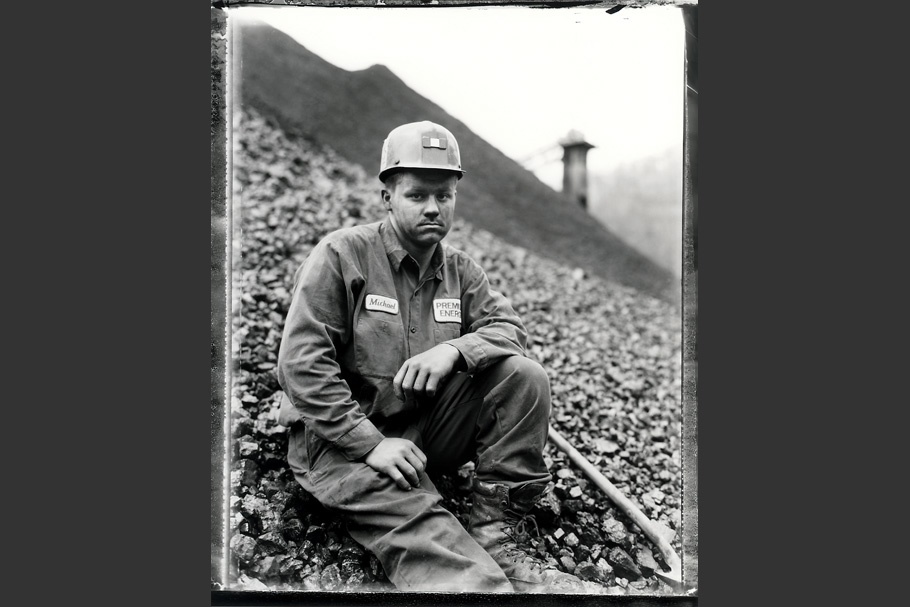
Gilbert, West Virginia, March 24, 2002
Michael Blankenship, age 19, Majestic, Kentucky
I doubt I’ll go to college. I guess I got this job, and then after that I pretty much knew I would want to work the rest of my life instead of going to school. I got my first job when I was 16 years old, because I was worried; I thought I was going to be a daddy. You get scared, so I thought, I’m not going to be scared no more. I’m just going to get a job and that way if something does happen I won’t be in as bad a shape then.
I’m lucky to have this job ‘cause they pay really good: $15.50 an hour. Most miners only get 40 hours a week and here we get 60 hours a week and overtime that pays real good money, time and a half. I guess while I’m young I don’t have to sleep as much as an older person. We start at six every morning, and we work six days a week, 68 hours a week.
My dad worked in the mines for, I think it was, 22 years in West Virginia, and then he hurt his back so he’s disabled now. He’s at home. We don’t get to do as many things as we used to because of his back and because I work a lot of hours. Some days he’s in pain and some days he’s not. Some days I come home and he’s trying to get into the house and he’ll just fall over. Some days he’s walking around fine.
In the future I would like to be a foreman, here at a mining company. Maybe Superintendent. Or maybe even a mine inspector. I would like to do any one of those.
One of the biggest things that’s ever happened to me would probably have to be my girlfriend. It changed my life from where I was doing, basically, just things for me, now it’s things for me and her both. We’re planning to get married. We’ve been going out a little over three years. She’s 19 too. Meeting her made me want to raise my own family, have a great job, do everything for her and me and the family, that’s what I want.
My biggest fear is dying. The emotion I feel most is probably love.
20070612-bowman-mw13-collection-006
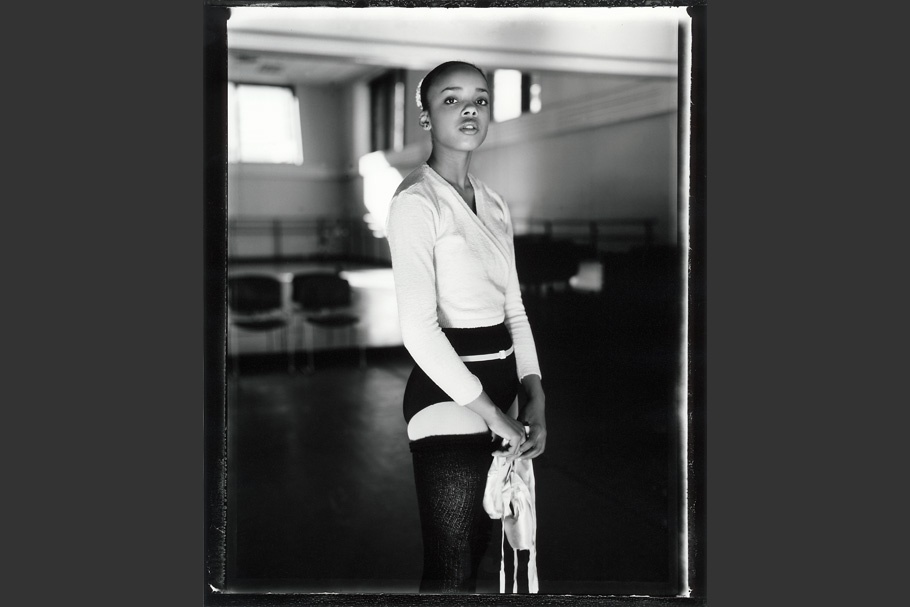
School of American Ballet, New York, New York, January 27, 2002
Morgan Richardson, age 15, Mount Vernon, New York
I’d say that when my father died, that changed my life. I was very young, so I didn’t know him much, but just going from a four person family to a three member family is a drastic change. But my mom was very strong and she took over the business that he had, which was a karate school. And she has always supported me and my brother, so nothing we’ve ever had has been a burden and she teaches us that nothing is impossible. Whenever there is something that we come across that seems difficult at first to achieve, by what she’s taught us about believing in God and believing in yourself, it becomes something that isn’t impossible and that you can achieve.
I love to dance, honestly. Everything that’s happened to me for the past day, or week, or however long it was, when I dance I just kind of zone out of what’s going on and I just think about what I need to work on as a dancer. Um, aside from that I really like to help my mom. That makes me happy, whether it’s around the house or at the karate school.
The toughest thing about being a teenager is the decisions you have to make every day: Do I want to be a dancer? Do I want to pursue my academics more? And then there’s just generally other issues, [like] peer pressure. Luckily, because I’m so committed to ballet and school, I don’t come across them because I don’t really have much time to.
I don’t think that it is right to have sex until you’re married. I just think that is unethical and we’ve learned that ever since middle school. I don’t understand why people can’t obey that rule – it’s not a rule – but you know, I just don’t understand that. That’s all I have to say.
I honestly can’t think of someone else I would want to be. There’s people I would like to be like – like Aesha Ash, the only female African American in the New York City Ballet. There’s people like Oprah. You want her generosity. There’s people like models out there—you want their looks.
What do I like about myself? I see some people that don’t have something that they really love. And I like about myself that I really love ballet.
20070612-bowman-mw13-collection-007
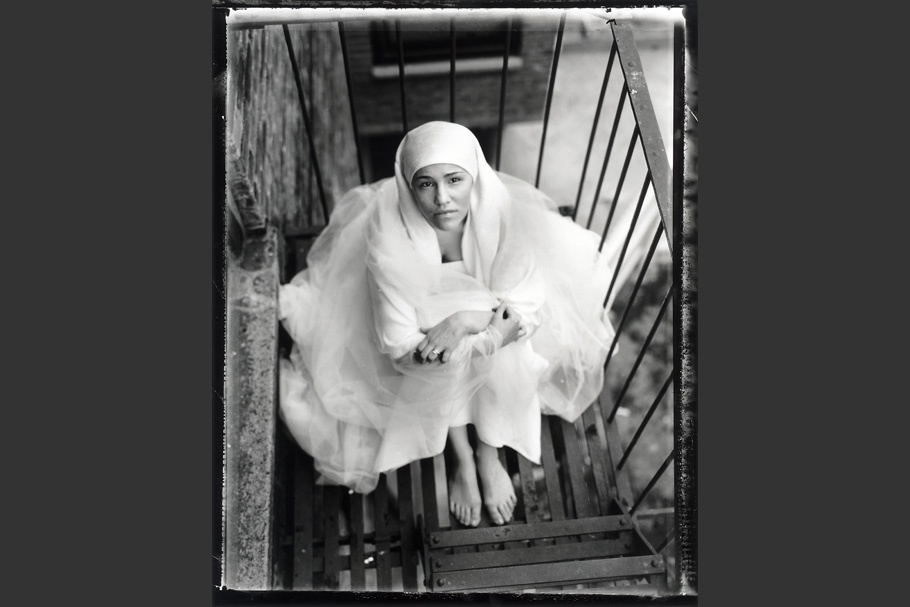
Bay Ridge neighborhood in Brooklyn, NY, April 19, 2002
Hasnija Abdul Moumen, age 19, Brooklyn, NY
9/11 changed my life. That day I was supposed to be in school, and it happened, and I went straight to the mosque and from that day on I covered, I started wearing hijab—that's Islamic headdress—and I just changed my life. No more bars. No more dancing. Not going out with friends that much. Getting into Islam was like “Whoa, this is what I have to do, this is an obligation.”
My biggest fear is God. Definitely. I have no fear of men, no fear of animal. When I was younger, I used to ask my dad, “Daddy, what are you scared of?” And he’s like, “God.” And I’m like, “What about a big shark that comes and eats your head?” He’s like “No, honey, God.”
I had this thing about www.muslimsingles.com on the Internet, because I was new to the religion and I wanted to meet people, get different people's perspectives and yadda, yadda, yadda. So, Ihad, he emailed me saying, “Hey, what's up?” and me being very open and honest, “How are you, how's everything, you live in Brooklyn? Cool, let's go meet up. We'll go paint pottery.” And we did. And I was like, “What a sweetheart!” He brought me flowers.
On our second date we went to this really cool place on 100th street, and we sat in the old back room at a little table, and he said, “Hazzy, how would you feel, like, would you marry me?” And I turned bright red because I didn’t know. I was like, “Swear to God, are you serious?” And he was like, “Yeah I want you to marry me and be my wife,” and I’m like, “Holy Shit!” and I was like, “Yeah, I’ll marry you…”
I’ve known Ihad maybe a month and a half. We got married last Friday. I was crying because everyone was in a white wedding dress and I was in slacks and sneakers. We just came back from joining a mosque and it was raining and my feet were wet and I was just like, “Wahh…!” I don't know, it happened so fast. I married him because he was a good Muslim. Thank God. I didn't marry him because I was blindly in love with him. I wanted him to improve my being, improve my religion, get me straight up to heaven.
20070612-bowman-mw13-collection-008
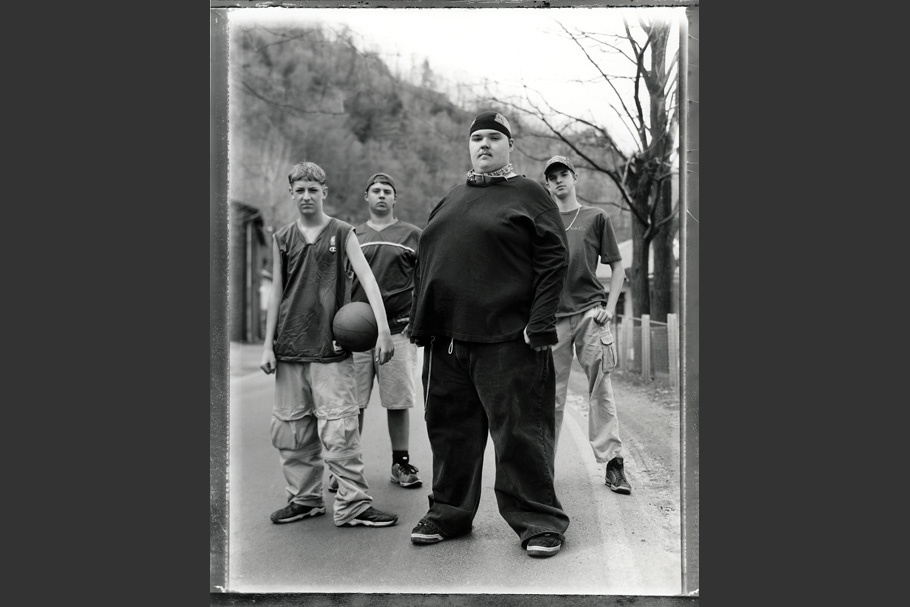
Bradshaw, West Virginia, March 24, 2002
Left to right:
Stewart W. McAdams, age 16, Jolo, West Virginia
I started going to church about four years ago. First because my mom made me, then it started getting pretty cool. ‘Cause stuff started happening, like life started getting better – you get more out of life.
I’d say religion is one of the hardest things about being a teenager. Because there are so many different ones out there. I’ve chosen mine, but there are still people out there trying to get you to do different stuff.
I’ve never had sex and I’m pretty proud of that decision, because I ain’t gonna go out here and have a baby at 16 and not be able to support it. That’s just something you want to keep for the right person.
I would say that one thing in the world I would change would be social outcasts, because everybody should have a chance to do well and they shouldn’t be picked on because they’re not rich enough to afford stuff.
Well, I’m like the most popular kid in school because I’m energetic and I’ll be friends with anybody. I’d have to say I like school because you learn a lot and ‘cause, well, I have a lot of friends.
I have to say it bothers me that I haven’t got enough muscle.
Ray Mowrer, age 18, Jolo, West Virginia
My mother, she used to be a runabout. She didn’t like taking care of her young’uns. I was born in Richmond, Virginia, and from there she kept me in an old abandoned building overnight, and I took a real bad flu and she took me to a welfare office and said I can’t keep him. When I was a month and three days old I was officially adopted by my grandmother.
My girlfriend makes me the happiest. I’m with her all the time, and just watching her, and the way she changes me. I tell her I got a smile on my face all the time. I’m right now engaged to be married to her. I do not know exactly when we’ll get married. She will be turning 18 this June, and we was hoping to get married on her birthday.
My fantasy is I want to live like Nelly. He’s a rapper, a black guy. He owns a million, probably a billion dollar home. He’s got like 20 vehicles—eight or ten PT Cruisers, stretch limos, you know, everything.
I think I could have an impact on the world. I’d like to be President of the United States.
In reality, I’ll probably be a coal miner, marry my girlfriend, hopefully have two kids. That’s the closest thing to my reality right now.
Jeremy Dwight Ball, age 17, Bradshaw, West Virginia
Yes, I believe I have suffered from discrimination because of how much I weigh. People have made fun. I have some friends, if anybody says anything, then they’ll defend me. It makes me feel good to know that there are people that would help me.
Religion is not so much a part of my life as it used to be. I don’t believe so much that I’m moving away from the church; it’s just that I’m not going. I believe that when God comes to get me I’ll be ready to meet him, but I don’t believe that I need to spend my time in church for him to believe in me.
I’m also Gothic. As a Goth, I believe in being neutral—trying not to put myself in a place where I would influence anyone’s belief in religion. Gothicism is something that I started believing in when I was 15. There are very, very few Goths in West Virginia.
The administrators at my school, they try to give me a hard time; they’ve restricted me from wearing my collar. They weren’t even going to allow me to wear this necklace. They’re saying it was considered a weapon. The collars are a gift between Gothic lovers. I bought my girlfriend’s, and she bought mine.
Mathew Phillips, age 17, Paynesville, West Virginia
A big thing that changed my life was when I nearly got my fiancé pregnant. She didn’t get pregnant; she had a miscarriage. When I almost got her pregnant was the day I asked her to marry me, about three months ago. We’ve been together for seven months. She's 15 going on 16, and I’m 17 and a half.
My dad passed away about 4 years ago. He wasn’t my biological father; I’m adopted. I was closer to my mom, but I was really worried about my dad because he was in a hospital bed all his life. He was a coal miner. He was diagnosed with cancer, black lung. He couldn’t walk.
We used to have black people that go to my school. We got two black teachers right at the moment, and no one really worries about them. I mean, we relate to blacks but, you know, there are some kids down there that won’t relate to them. I kind of like them myself, because I feel it’s fine to get along with blacks. I just don’t like niggers.
A black person is someone cool that you can talk to and be friends with. A nigger is one of the blacks that dresses nasty, don’t hardly ever wash, and they are just pure, all out nasty. We got wiggers at our school. White people that are basically niggers. They dress nasty, look nasty, you know, they wear dirty clothes. I don’t treat them different. I’m not the type of person to pick on somebody, because I’m just not that way. But I don’t like them. I just can’t relate to them.
20070612-bowman-mw13-collection-009
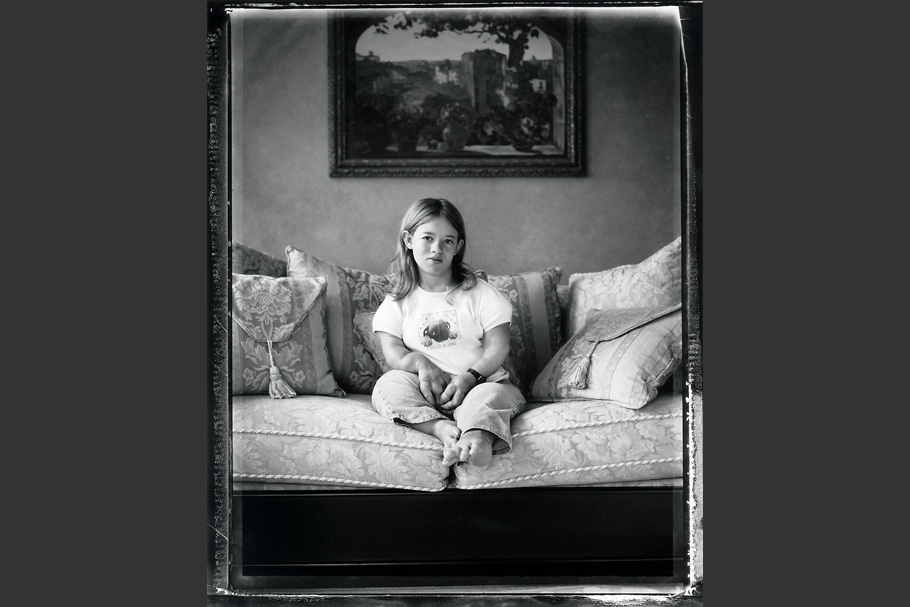
Nashville, Tennessee, August 2, 2002
Courtney Paslick, age 17, Nashville, Tennessee
Sometimes I feel anger towards people who stare at me, and anger towards the parents that don’t teach their kids manners. Some people just let their kids stare. And others, when I say something to the child, get mad at me and say that I don’t understand. And I do, I understand more than anybody.
A big thing that happened to me was going to the Little People of America conference. All of my life I’ve been surrounded by average-size people, and going to this conference made me realize that there are other people that I can talk to about problems I have. It’s just a real eye-opener. Now I have a lot more friends to communicate with, and I realize that I am better off than a lot of other little people. And that I should be grateful for what I have.
I haven’t dated—ever. I have been really close to guy friends, but I haven’t dated and I don’t really know many people who are interested in dating a little person. It makes me mad that they don’t want to know me better and that they look at the outside more than the inside. I have a really close guy friend that I talk to. He’s average size, but he’s one of the guys that I’ve gotten really close to and have come close to dating, but have not quite. And he understands a lot of what I go through. And he doesn’t let people stare at me. He protects me wherever we go.
I know of one or two people that are gay, bisexual, and only one of them gets discriminated against a lot. He even got discriminated against by a teacher, which was a very, very big issue. It spread like wildfire. I didn’t think that was very good. I probably would have said something because I know what it feels like. But I wasn’t there.
You are what you are. You can’t help it.
Being around my friends makes me the happiest. We hang around at school a lot, even when school is not in session. And we go to each other’s houses and to malls and stuff. Just like regular teenagers.
I would just like to know what it feels like to be average-sized, to have a boyfriend.
I like everything about me. I wouldn’t change anything.
20070612-bowman-mw13-collection-010
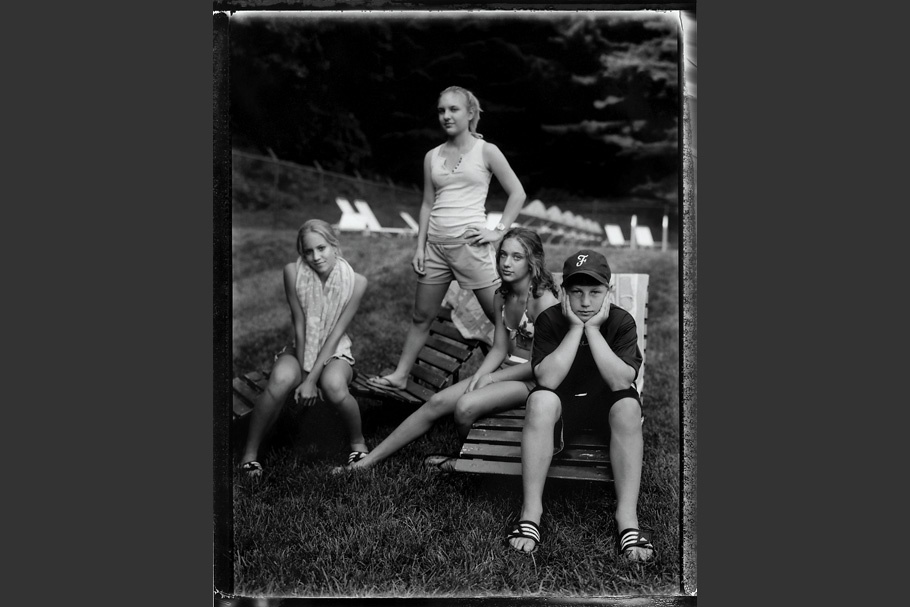
Mariemont Village, Ohio, June 24, 2004
Left to right:
Maddy McGrory, age 14, Cincinnati, Ohio
What’s my biggest fear? I don’t know, I guess just maybe not being liked.
I go to Walnut Hills High School. I’m going into 9th grade. Yeah, I’m excited, but I don’t think it’ll be that much different. I guess overall I do like school, but when I’m in school I don’t like it.
Have I had a boyfriend? Um, well, no, not really an official boyfriend. Like, I’ve never really gone out with anybody, but I’ve liked people that like me back.
As a teenager it’s hard not really being a kid but not really being an adult. Just being in between and not really being able to do what you do as a kid but not being able to do what adults do.
I don’t really believe in abortion because I think that it’s the parents’ fault for having a child and they need to be more responsible.
If I could be someone else in the world, I would be somebody famous, ‘cause I think that’d be fun and interesting, a lot different from what I am.
Ally Hamlin, age 16, Cincinnati, Ohio
My biggest fear is that when I get out of high school I’m not going to amount to anything. I’m really looking forward to getting out of high school and doing something else but I’m also nervous about whatever that might be.
Yes, school is important to me, because how well I do in school is gonna determine how well I do in the rest of my life.
Being a teenager is easy because I don’t have to make any really huge decisions yet. Like, I don’t have to decide exactly what I want to do with my life yet.
Yeah, I do think that I could have an impact on the world; if I really wanted to, and I really concentrated and devoted my life to that, I think I could. If I had my choice I would like to do that by being a doctor and maybe helping people who couldn’t always help themselves.
Money is important to me now because I just got my first job, so it just became important to me. Now I’m making my own money. I’m a lot more careful with it than when my parents gave me money. I spend most of it on clothing.
I like that I have a good work ethic.
Um, I respect my mother the most because she gave up a career to raise me, my brother and sister.
Leah Hamlin, age 13, Cincinnati, Ohio
I think my family is a perfect family; we have a very important bond. We truly connect. Everything we do is for each other.
I do believe in God, but I have a lot of struggles with it. If there is an eternal life after you die, and there is a Heaven and a Hell, it would be very important to me that I was loved and accepted by Him. But with the growing technology and new science, it makes it harder to believe in Him, and I feel if I make a statement, “No, I don’t believe in God,” then I’ll just be condemned. I don’t know.
The toughest thing about being a teenager is keeping an image up and not really so much being popular, but just being accepted by everyone; you can’t really be yourself if you’re trying to be what everyone else wants you to be.
I think that sex is something that should be saved for marriage, because when you give yourself to someone in that way and—especially if it’s your boyfriend—when you break up with him, you don’t want to think, oh well I gave that part of my body to him and I shared it with him and now I don’t have him anymore and I don’t love him. Sex is like giving away your soul and you want to give it to someone that you truly adore and love.
I’ve built my opinions on what my parents’ opinions are. Most of what I do is based on making them proud and giving them something to smile about when they see me.
Tyler Kenyon, age 13, Fairfax, Ohio
For the first couple years of my life I was in Missouri. My parents owned a farm there. It’s different down there than it is here because there’s a lot less people. There’s not as much ‘city life’ and stuff I guess.
Yeah, I have a mother and a father. They’re not together but my father comes over a lot and we play tennis and do a lot of things together. I spend the night at my dad’s house every other Saturday, and he comes over maybe three days a week, two days a week.
I live with my mom. I respect my mom because she’s always been nice to people.
I think I will become an architect. My parents always said I sort of have the mind and stuff for an architect, and I’m good at geography and stuff.
20070612-bowman-mw13-collection-011
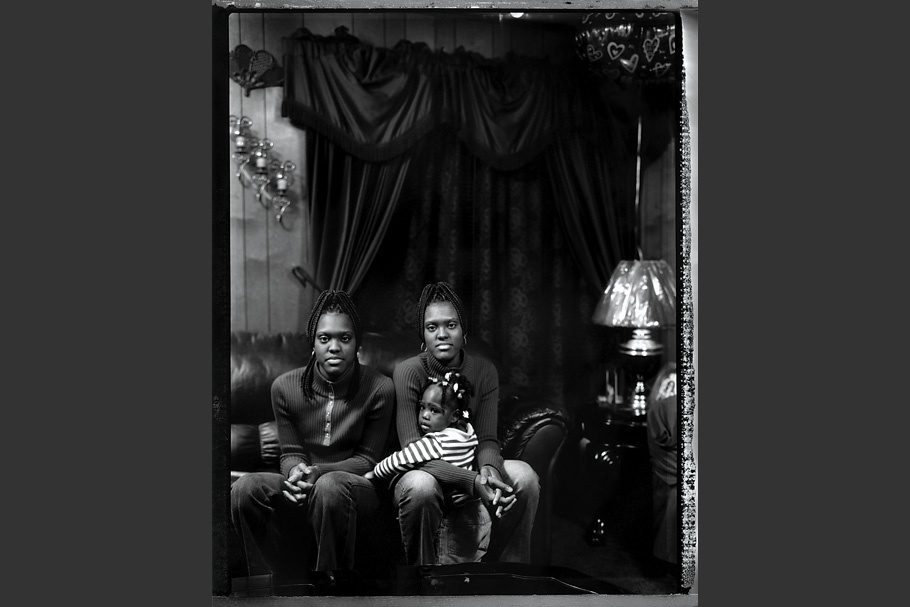
Pattison, Mississippi, February 14, 2004
Left to right:
Sharonda Rankin, age 19, Pattison, Mississippi
The most biggest thing that has ever happened to me is, really, going to school for hair. It has changed my life by, you know, I help other people by redoing their hair. It helps their self-esteem. It boosts them up. I just like doing hair just ‘cause you know, we make people feel good. It’s not really about the money.
I started just by doing my sister’s hair, you know, my mother, family members. Eventually once they go out and other people see, then they start calling, and I just started doing other people. I went to school for it. I just graduated.
I cried when I found out my sister was pregnant, disappointed. It hurt me, ‘cause I told her I thought me and her were just going to go on, you know, a couple more years. It would have just been me and her. I just wish she would have waited. It’s good now that the baby’s here. You know, you think about that once she was pregnant. But once she had it, you be happy; she fit in just fine.
Most people who don’t go to school, seems like they don’t do nothing. If you get used to staying at home everyday, then that’s what you are going to do. I’d rather go to school and do something and make something of myself then staying at home.
I can have an impact on the world, just like I said just by me doing hair. Helping people out. Boosting their self-esteem everyday. I’m satisfied with that.
Louvonda Rankin, age 19, Pattison, Mississippi
The biggest thing that has happened to me was the day I gave birth to my child. It’s changed my life ‘cause growing up now is a big responsibility. Sometimes I thank God for what he has done for me, even though it’s a big change, but I make it through.
I was depressed when I found out I was pregnant. I wanted to have a child, but I didn’t want to have it, you know, at the age of seventeen. But things happen, and I had to take on the responsibility for having a child, of raising a child. The father was there in the beginning, but things happened. He take care of her but, you know, we not close.
My parents were divorced when I was young. I don’t see my father very often. I miss having a father around a lot.
The toughest thing about being a teenager is taking on responsibilities like going shopping. It was easier when I was younger, ‘cause I was spending my mama’s money, but now it’s my own. I’d rather spend my mama’s.
Well, for my future I see me having at least one more child. Not now. I plan to get married when I’m about 30 and start a family. But I’m being in school right now. My major is nursing. I plan to have a good education, job and to be able to take care of me and my family.
Being with my family and spending time with my daughter makes me the happiest.
20070612-bowman-mw13-collection-012
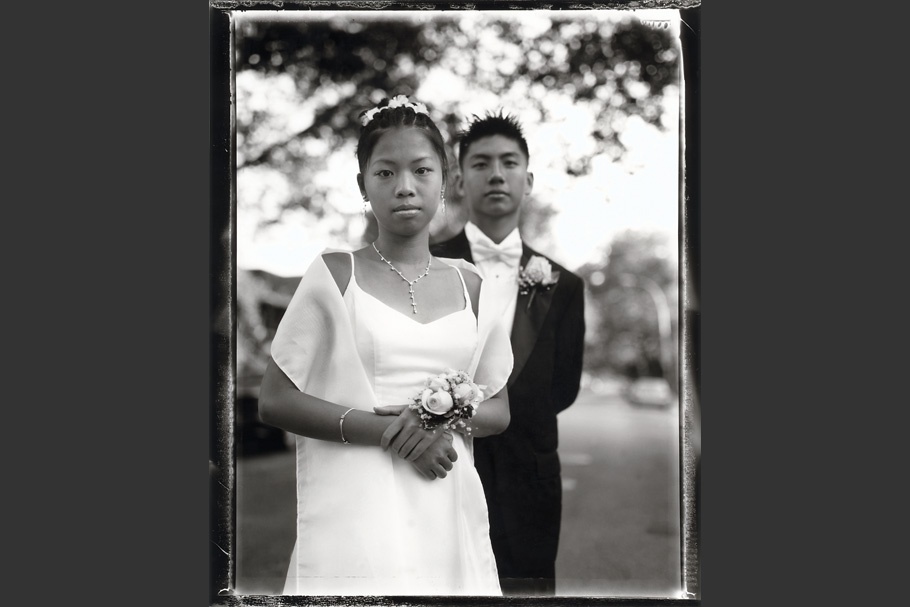
Bensonhurst neighborhood in Brooklyn, New York, June 8, 2002
Left to right:
Mary Yee, age 18, Brooklyn, New York
When I was a little girl I used to live in a very racist neighborhood; it caused me to not know myself. There were a lot of colored people, and seeing that us Chinese people lived in a brand new house they were of course jealous in a way, ‘cause they lived in the projects. So it caused them to mock us or take what we had by, like, robbing us. I just hid so I wouldn’t get picked on, you know? I was scared.
At first I didn’t want to move. But moving made me be able to learn about myself, like shape myself as a person. ‘Cause I’m not afraid for my life; I can just walk around and be happy instead of walk out and be scared that someone’s going to take my life because of my race.
I’m always trying to find who I am, ‘cause a chunk of my life I was just like what people thought of me: “Oh you’re that Asian girl; you’re the quiet one.” Every single day you learn something new and that shapes you as a person. I like to keep defining myself until I’m that person that I’m supposed to be. I’m happy to be both Asian and American, ‘cause I celebrate both holidays and it’s like my tongue is split into two; I have two dialects.
Darin and I promised no matter what we’ll go to senior prom with each other. And we made that promise in ninth grade, ‘cause we’re best friends. I’m excited about my prom, but right now I still have the stress about doing hair, fixing my makeup, looking the best.
Darin Chin, age 17, New York, New York
My biggest fear is that I won't be able to make my parents proud enough of me. It's difficult ‘cause I'm not always going to fulfill what they want me to do.
I'm pretty close to my parents. It's a trusting relationship and I'm glad of that. I think family is probably one of the most important things in anyone's life because I think it's the support, and what a person needs to live, to understand.
I think about having a family of my own a lot. Probably, I don't know, three kids and a wife. I think, you know, there's not a family who won't have problems and issues. I think a family should have challenges to better know each other and just learn more about each other.
Sometimes I feel that I don't question enough things around me and I don't challenge the feelings of others. I just go along with it and I like to think that I could maybe become stronger and a deeper person in that way.
I am excited about prom. I'm kind of nervous actually. The whole dancing thing, I don't know, it gets to me! I haven't danced for a while, so I don't know how I'm gonna get up there and do that, but hopefully I'll loosen up and it'll be okay. I bought a corsage for Mary. I think it'll be worth it. I'll have fun, I think.
20070612-bowman-mw13-collection-013
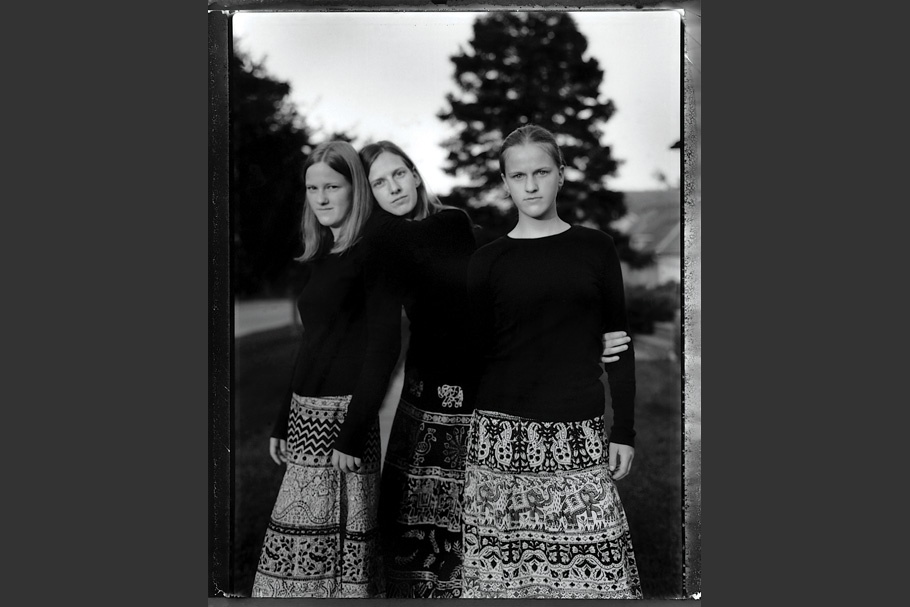
Postville, Iowa, July 16, 2004
Left to right:
Menucha Lederman, age 15, Postville, Iowa
I was in New York this year for school and it made me more, like, not so dependant on people, you know? I was there because there wasn’t a high school here in Postville for the Jewish community. I miss my family a lot when I am away at school. I’m not sure if I’m going back to New York for school next year. I don’t think so. I think I’m doing a home-schooling thing here.
No, I’ve never had a boyfriend. We don’t have boyfriends ‘cause the boys and the girls, we don’t mix. When we wanna start dating—when we’re old enough, you know, to get married—then our families find people.
I want to have like a lot of kids, you know. Maybe seven or eight. I will marry within the Hasidic community, ‘cause I wouldn’t marry out of my own religion.
Um, I think I might go to college. I’m thinking about it. I want to study cosmetology and do that. One day I would like to own a little store or parlor.
We don’t have a TV in the house. Most of our community doesn’t have a TV because there’s some stuff on TV that’s immodest and those things that just don’t go with our religion and stuff.
If I could fix one problem in the world, I’d like to fix the thing about Israel and the Arab countries and all the suicide bombers.
Perel Lederman, age 19, Postville, Iowa
To be Hasidic means, basically, someone who does more than what is required from them. The whole religion is geared to keep yourself separate from non-Jews. Not in a bad way, but simply to protect, to keep yourself Jewish. To keep yourself religious, because there is nothing wrong with non-Jews. They are friendly and not evil. But, you have to be separate, and you have requirements to fulfill. You have obligations, and you can’t forget that. So why is being a Hasidic Jew important to me? Because I am a very logical person, and I like to have a meaning in what I am doing in life, and I need a reason.
One of the biggest problems in the world that I would like to fix is hatred towards minorities. And I guess I have a problem with the white Christian male. The white Christian male doesn’t account, or believe, or have any respect for anyone else besides themselves.
I support the war in Iraq. Iraq is a big threat. The Muslims at this point, the Middle East at this point, they are going a little far. And here I’m discriminating against Muslim extremism; not Muslims, but the fanatical ones that want to kill everyone else.
My fantasy is to get a degree in law, and then in handwriting analysis and psychology. And to go on and to work in, um, like detective work, FBI work or something using those three things. What will I really become? Um, a mother. I think that is a very important job to take very seriously. I think I will also go to a community that doesn’t have as much religious Jews and establish it there. Build it.
Henna Lederman, age 13, Postville, Iowa
I’m Jewish, Hasidic. My personal reaction to it is it’s cool, ‘cause it’s very different. I like long skirts, personally. But you can’t really wear anything above your knee. You can’t show your elbows, and your neckline can’t show. In the summer, you go to waterparks, you can’t wear bathing suits out. So I wear long clothes still, and I feel weird, but I do it anyways ‘cause I have to. Wearing modest clothes is very important to me. I feel if I don’t, I’m not dressed right. It’s like walking around naked.
My belief in God is important to me personally, because I believe someday the redemption will come and I want it to come. We’re waiting for it. I believe it will come soon. I just believe it; it comes naturally to me.
My religion isolates me because other people look at me differently. I feel strange, and then I’m blonde so people also think I’m dumb ‘cause I’m blonde. Being Jewish and stuff, you’re very separated in two different worlds; you’re a girl or a boy, they can’t mix. So it probably changes the teenager reality, I can see that.
The thing I like most about myself is that I like to do things with others. I don’t like to be alone, or leaving people out.
My family is very fun. It’s really cool, we have six kids: five of us are girls, one’s a boy. That’s pretty interesting for him probably, but we have a lot of fun.
Yeah, I think I’ll get married. I’m gonna marry someone Hasidic most likely. We’ll have four or five kids. I want to have a very active, funny family.
20070612-bowman-mw13-collection-014
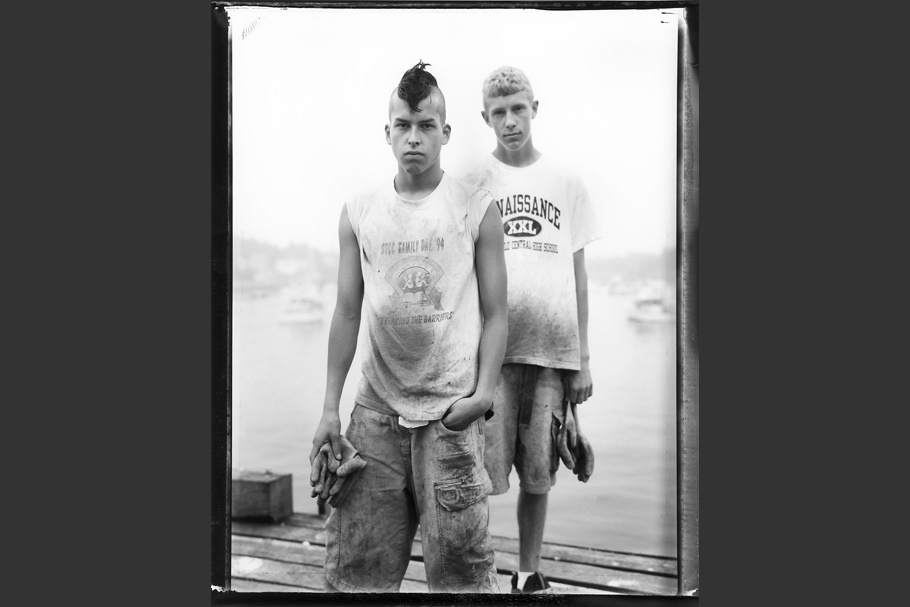
Vinalhaven, Maine, July 8, 2002
Left to right:
Gage Boone, age 17, Springfield, Massachusetts
I was actually born in Colombia, in Bogotá. I was adopted when I was four months old. If I was in Colombia right now I would be dead, because I had a blood clot in my brain, and I would have died because I would've been on the streets.
I like that I sort of think about things from all different angles. Like, I won't just jump to conclusions. I try to just look for the good and bad in everything. Because I think there's a lot of beauty in ugliness and ugliness in beauty.
My main focus in life is to have an impact on the world, you know? I wanna change things and I want to be heard. I am an artist and I've sort of known since I was really young that I'm going to one day make clothes. I think I'm going to use that as a catalyst to bring other aspects of art and writing and photography and like everything into the broad landscape of things.
Right now, I work on the docks in Maine ‘cause there's a big lobster industry up here and it's good money and it's hard work. I shovel bait and move lobsters around.
9/11 was sort of a process of feelings. At first I thought of it kind of as funny in a way. I was like, "Ha ha, look, we got blown up!" And then I wanted to be there and look at New York when there was just no one there. And then as I started to, like, hear and see more of what had actually happened it was horrifying and completely scary.
But after that first week I started to see, in a way, we deserved it, you know? Like, I think that it's kind of funny that people are like, "I don't know where this came from." ‘Cause we've done so much horrible things to other countries and we're not really sincere about our interactions with other countries you know? It's more for money and stuff. And then, the whole over-patriotism of everything just sort of completely brought me down and gave me like no respect for the way that America dealt with it. It sort of just made me want to move out of the country.
Wilson Boone, age 15, Springfield, Massachusetts
I believe in God to a certain extent. I believe in evolution, but I believe that something had to start it. People believe that evolution began with the explosion of dust. But where'd the dust come from, I guess?
I respect my brother. He's like a really cool kid and gets along with everybody, doesn’t have problems.
If you don’t have family than you don't really have anything. I mean, you could have money and power or whatever, but if you have no family and no one to be around, then you're just going to be lonely. It's not really worth it.
I would be a professional snowboarder if I could, but I doubt that's going to happen. In reality I have no idea. I don't know what I'm gonna be. I haven't really thought about it. Just trying to live in the moment.
20070612-bowman-mw13-collection-015
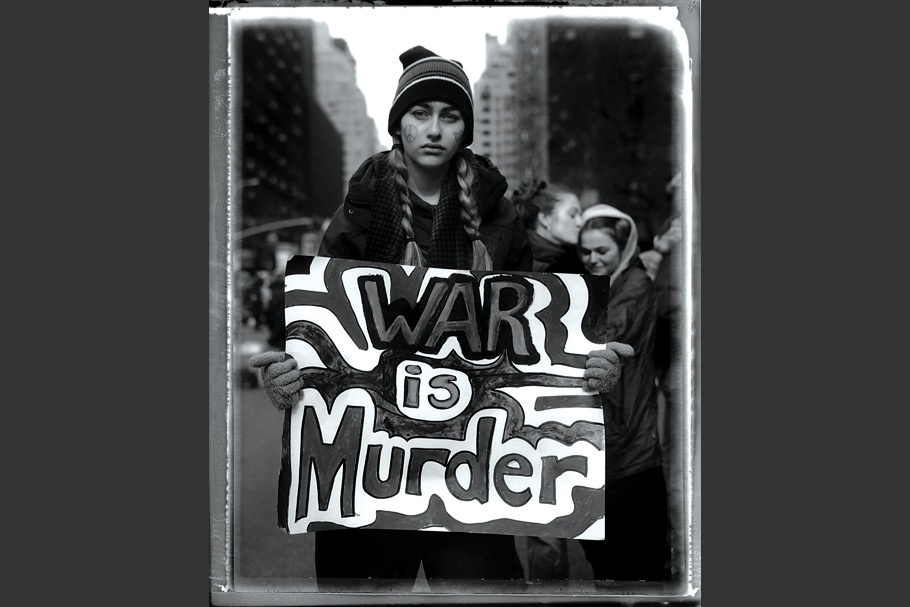
Antiwar Protest, New York, New York, February 15, 2003
Claire Louge, age 16, Ithaca, New York
There’s so many mixed messages aimed at teenagers. Like for example with sex: the media will be, like, “Oh, have sex!” and stuff like that, and you know, since America was always a Puritanical society, we’re being bombarded with two different messages. Don’t have sex and have sex. There’s so many mixed messages and the media has such a powerful impact, but then your family does too, and your friends do too.
Yes, I’ve had a boyfriend. With me guys are so frustrating; I don’t understand them and I don’t think I ever will. Um, because frankly the guys in our grade have no sex drive. They don’t want girls. They are just not interested. I don’t understand this because usually it’s the guy pursuing the girl but now, like this year especially, it’s the girls pursuing the guys…I don’t understand that at all!
Gym is my least favorite part of school. I participate in gym, but the idea of gym is ridiculous. If there was anything I could start a revolution on, it would be gym, because I hate it.
It’s impossible, but I would just love to have peace in the world. It would be so perfect if no one was always angry at each other, and always fighting; it’s ridiculous. I mean in this protest, that’s what we’re trying to do. But that’s going to be impossible. We can’t have no war in the world. Total peace is impossible. Because there’s always going to be conflict, differences of opinion. And those opinions are going to clash and people are going to argue.
You know with something like this protest, I couldn’t protest alone. I don’t think I could have a really big impact by myself, just one person, because to act in large numbers is essential.
I think the feeling of being really loved or accepted makes me the happiest.
What do I like most about myself? That’s a hard question… when I persevere, I guess. I know when I try something I’ll keep on going.
20070612-bowman-mw13-collection-016
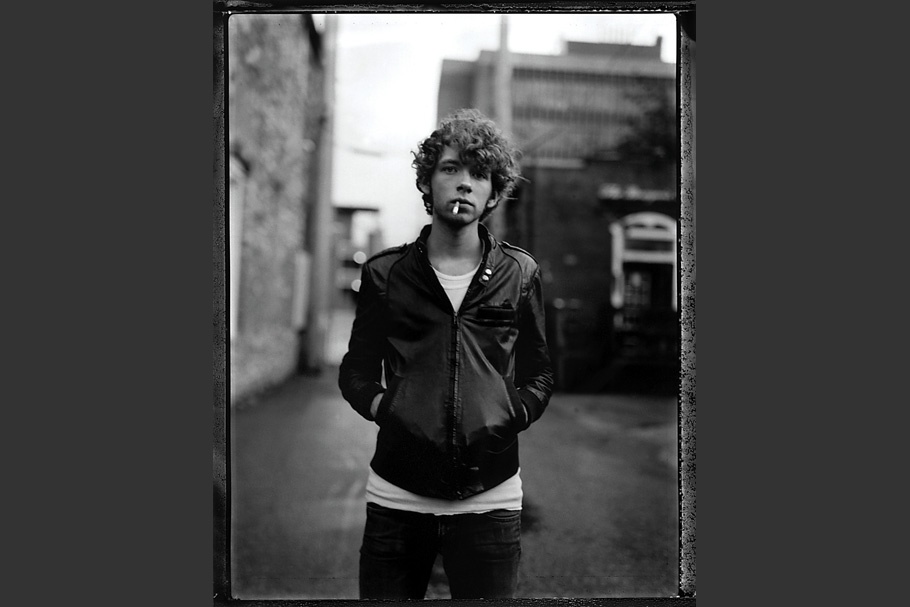
Lawrence, Kansas, July 2, 2004
Patrick Roberts, age 19, Lawrence, Kansas
When my parents got divorced I was about 10 years old and the reason they got divorced was because my mom was, or decided, or found out, she was a lesbian. I’d say that’s one of the most influential sort of moments that affected me; it just changed the way that I looked at things, and I think that it caused me to sort of try to grow up faster or to look at things from a perspective that a lot of my peers and classmates weren’t looking at things at that point.
I was raised in the Episcopal Church, and when I was about 14, I sort of felt that to be honest with myself, I had to admit the lack of interest I had in Christianity, the lack of investment I felt and the large number of questions that I had about it. I felt I didn’t want to be sucked into something just because it was tradition or something that my family believed.
I think my biggest fear is sex. It scares me because to me it comprises my independence, and also the idea of having a child really terrifies me.
Honestly, right now I’d say no, I won’t ever get married. I think it’s largely due to the fact that my dad is now on his third marriage, my mom is on her, you know, third partner or, you know, long term relationship. I think that that, along with the way I see marriage as an institution in the US, I think I have become a little disillusioned. I think that maybe it’s overrated to a certain extent and I don’t think it’s necessary today. I think people do it because they’re expected to. I would like to have a child some day, but I’d like to try raising a child without being married to someone, maybe with someone, but not necessarily married to them.
Recently, I think I feel lonely, if that’s a legitimate emotion. I feel like I’m looking for something, something that I can’t find.
The person I respect the most is my older brother Andrew, because he is the most selfless person I know, and I think I’m the most selfish person I know, and I always try to be more like him in that way.
The American political system I think is pretty fucked up right now, and I hope that some time in my lifetime I will see a pretty dramatic change in that. I would like George W. Bush to be long gone. I think that the war in Iraq is ridiculous and I think it’s embarrassing to Americans. I think George Bush is an embarrassment to Americans, not as an individual, but as a representation of the lack of information and the lack of awareness in America.
The easiest thing about being a teenager is still having a sort of romantic perspective or outlook on the world, not being jaded, or disillusioned and knowing—hoping—that you have time to do what you want and to achieve what you want.
20070612-bowman-mw13-collection-017
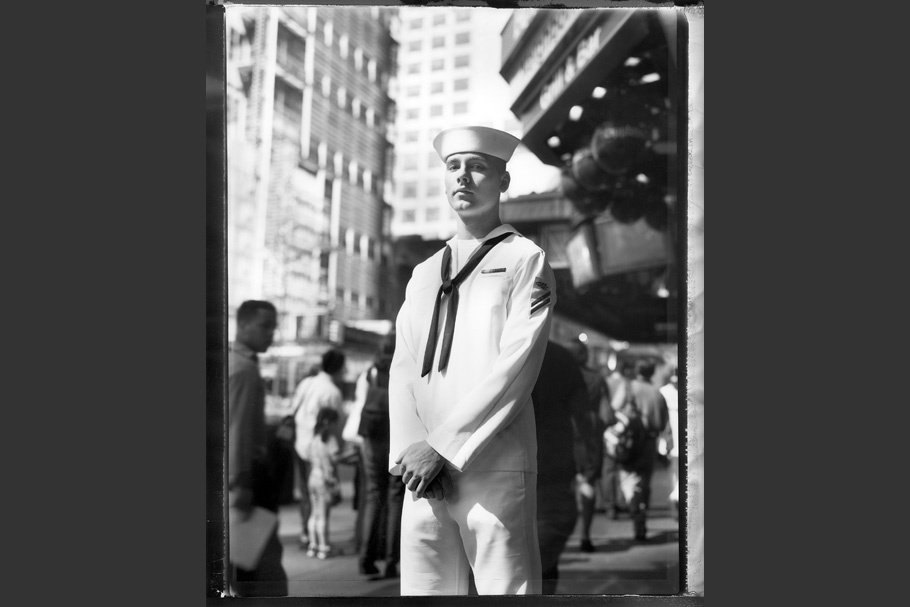
New York, New York, May 24, 2002
Blake Barlow, age 18, Easton, Georgia
School is important because it teaches you history, you know, where you came from. Like math, that’s the basic language of the universe right there. Family’s important because that’s your basis for the kind of person you are, really.
I’m from Georgia, so I’ve suffered from the reverse discrimination, you know from black people, “cracker this” or “cracker that,” “white cracker,” “white boy” or “whitey.” It’s just funny; I think it’s funny as hell. Words don’t really bother me. People don’t know you, how are they gonna say something about you? I see people, there’re a lot of rednecks where I live who are like, “nigga” this, “nigga” that, and I’m like, “Man, shut the fuck up!” and they say, “What you gonna do about it?” and we start getting into it. I’m just like, whatever. I think its stupid, just ignorant people. I’m sure I’ve discriminated against someone on one or two occasions…I wouldn’t put it past me!
My dad was in the Navy for 23 years I think, and he retired, he had fun, so I figured I’d try it out and see if it lasted.
On 9/11 I was on my ship (U.S.S. Iwo Jima) in Norfolk, Virginia at work. A guy called up; they were watching TV from downstairs and he said, “They just bombed the two World Trade Centers and the White House.” We were like, “Oh my God,” and we ran to turn on the radio. Since then it makes you more aware of who you talk to and what you do. Not more fearful, just more cautious. It worries me every time we have watches. You see a boat come by you don’t know if it’s coming towards the ship or just cruising by.
Any minute, you know, we could be sent over there, to Afghanistan, to Iraq. I would go, yeah. Oh yeah. I wish I would’ve joined the Marines so I could go down there and shoot at people. I’d rather do the ground action. I’m hoping to get a special assignment to go do something.
I don’t look at other ethnic groups differently since 9/11. I think all of them are the same. Everyone stereotypes people even if they think they don’t, yes, everybody does. It’s just how far they go with it.
Robin Bowman is a New York-based photojournalist devoted to documenting social and political issues, both at home and abroad.
After majoring in Anthropology at Wheaton College, Bowman studied photography at the Maine Photo Workshops. In 1984, she moved to New York City where she worked at Magnum Photos before pursuing a career as a photojournalist. She now resides in Maine.
She has worked as a freelance editorial photographer for such publications as the Berlin Journal, Fortune, Life, Newsweek, the New Yorker, Sport’s Illustrated, Time, and U.S. News and World Report. She also spent four years as a contract photographer for People.
Her magazine and book projects have taken her to Bosnia, Cuba, Finland, Haiti, Israel, Mexico, Nepal, Rwanda, and South America. For the last five years, Bowman has been interviewing and creating collaborative portraits with teenagers across the United States, which will be published by Umbrage Editions in the Fall of 2007.
In 1995, 1996, and 1999, Bowman’s photographs earned awards of excellence from the Communication Arts Photography Annual. She is the recipient of a 2005 W. Eugene Smith Memorial Fund Fellowship, and she has received several grants from Polaroid. Her photographs have been included in exhibitions worldwide and are part of the International Polaroid Collection.
Robin Bowman
For the last five years, I photographed and interviewed more than 400 teenagers across the United States, documenting personal histories of the largest generation of adolescents born since the baby boom.
Adolescence is a time of insecurity feeding off the trauma of change, an often volatile time when teens experiment with different identities and seek to define who they are becoming. They challenge the definition and boundaries of normality. The breadth of my inquiry has ranged from grandchildren of a presidential family to teenage gang members in New York City, from a prodigal teen born to talent to one of the only teenage coal miners in West Virginia.
This project is not an outsider’s assessment but a collaborative effort. My use of a Polaroid camera allows the teens to view their pictures immediately and to refine poses and appearances until the final image captures the way they want the world to see them. It is through this process, informed by feelings of trust and openness, that the impact of this study is generated.
The power of these images is complemented by the words of the teenagers themselves. Through candid interviews, I have captured their complex thoughts and feelings about their lives, hopes, fears, families, beliefs, and undefined futures. Their responses to a series of 25 questions allowed me to explore their attitudes toward sensitive subjects such as race, religion, sexuality, and the trauma of 9/11. While the words and images provide no final answers, the project offers many solid clues about the shape of this generation—and the country that formed them.
New ethnic groups seeking freedom and opportunity have rivaled the surge of early immigration that made this country great. Many Americans feel a sense of pride about the country’s diversity, but many others, especially in rural America, hold on to a sense of national identity that is threatened by diversity. Ethnic groups that leave the urban centers and relocate to more remote areas of America are changing these communities and challenging attitudes toward differences. Their teenage children, confronted with the desire to assimilate and the need to preserve cultural identity, are part of the cultural face of contemporary America.
Other themes, familiar from the recent election in which the nation seemed divided into warring camps of red and blue, also emerge from the images, especially the clash between state and religion, war and peace, individual freedom and the demand for communal control. Equally telling, and disturbing, are the common threads: there is no shortage of absent parents, irrelevant schools, drugs both legal and illicit, and violence. But the project is not despairing. Rather, it finds hope in the strength and courage displayed by these remarkable young people as they struggle to define themselves.
Most people have a preconceived notion about what it means to be an American. I hope that the diversity of these stories will challenge and change some of these long-held beliefs.
—Robin Bowman, June 2007